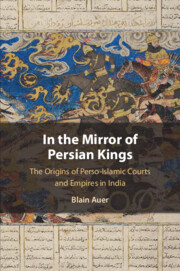
- Publisher:
- Cambridge University Press
- Online publication date:
- April 2021
- Print publication year:
- 2021
- Online ISBN:
- 9781108935876

For a period of nearly eight hundred years, Perso-Islamic kingship was the source for the dominant social and cultural paradigms organising Indian political life. In the medieval world of South Asia, Persian kingship took the form of a hybridized and adaptive political expression. The Persian king embodied the values of justice, military heroics, and honor, ideals valorized historically and transculturally, yet the influence of the pre-Islamic Persian past and Persian forms of kingship has not yet been fully recognised. In this book, Blain Auer demonstrates how Persian kingship was a transcultural phenomenon. Describing the contributions made by kings, poets, historians, political and moral philosophers, he reveals how and why the image of the Persian king played such a prominent role in the political history of Islamicate societies, in general, and in India, in particular. By tracing the historical thread of this influence from Samanid, Ghaznavid, and Ghurid empires, Auer demonstrates how that legacy had an impact on the establishment of Delhi as a capital of Muslim rulers who made claims to a broad symbolic and ideological inheritance from the Persian kings of legend.
‘If James Mill dismissed the Delhi Sultanate as “a government, moulded and conducted agreeably to the properties of Persian civilization, instead of a government moulded and conducted agreeably to the properties of Hindu civilization” Blain Auer shows the opposite. He argues that Muslim chroniclers of India self-consciously connected their reigning patrons to pre-Islamic Iranian kings precisely because this model provided a more universal ideal of governance that was far more suited to the diverse subject population of the subcontinent. Auer should be commended for elucidating this theme in a monograph-length study.’
Ali Anooshahr - University of California, Davis
‘Crisply narrated and richly detailed, this thought-provoking re-evaluation of a key moment in South Asian history offers a valuable corrective to the polarized narratives of the present. Through a magnificent array of primary sources, Auer illuminates the theory and praxis of politics during the rise of a ‘Persian imperium’.’
Supriya Gandhi - Yale University
‘A very important contribution to the study of Islamic kingship. Every library interested in the history of India, Iran and Central Asia should acquire this book.’
Roy Parviz Mottahedeh - Harvard University
 Loading metrics...
Loading metrics...
* Views captured on Cambridge Core between #date#. This data will be updated every 24 hours.
Usage data cannot currently be displayed.